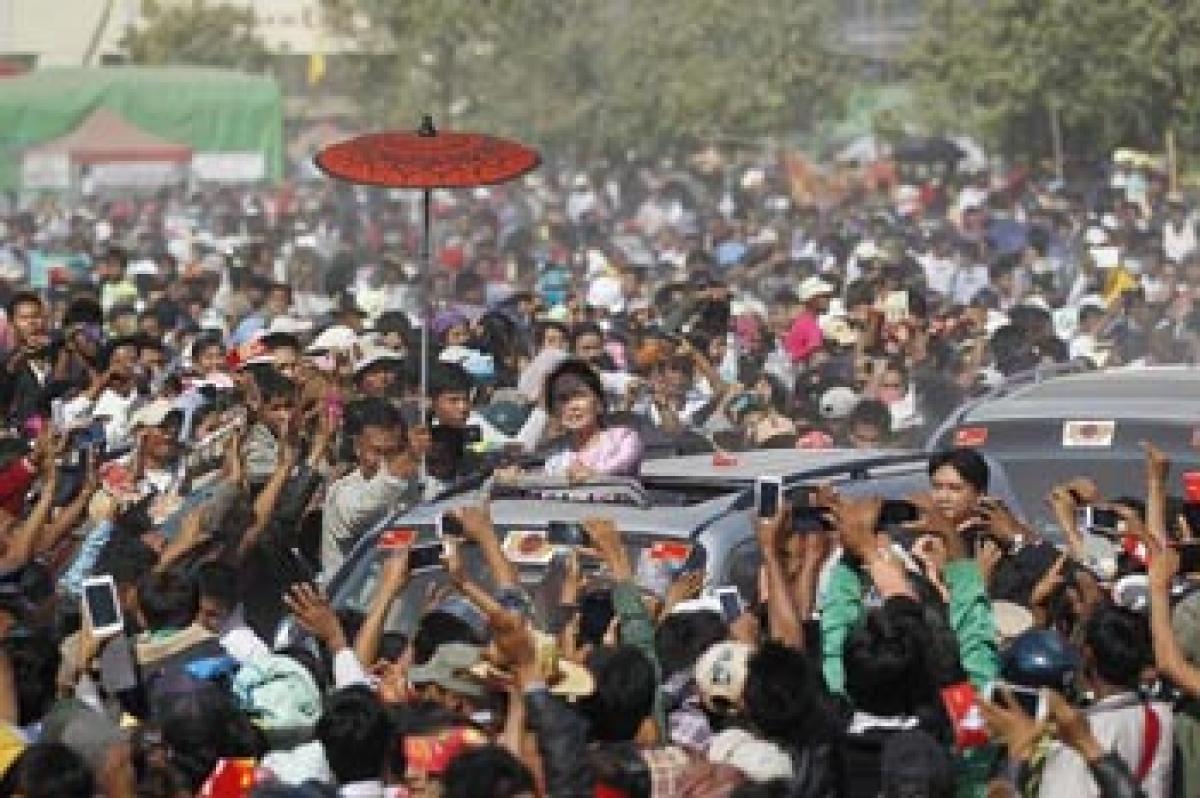Live
- NASA Tracks Five Giant Asteroids on Close Approach to Earth Today
- Pushpa 2 Hits ₹1000 Crore in 6 Days: How It Compares to Other Top Indian Films
- Vivo X200 and X200 Pro Launched in India: Price, Specifications, and Features
- Nitin Gadkari Admits Feeling Embarrassed at Global Summits Over Rising Road Accidents in India
- Comprehensive Review on Indiramma Housing Survey and Welfare Initiatives Conducted via Video Conference
- Jogulamba Temple Records Rs 1.06 Crore Hundi Revenue in 150 Days
- Opposition Slams ‘One Nation, One Election’ Bill as Anti-Democratic; BJP Allies Support the Move
- Celebrate Karthigai Maha Deepam Virtually with Sri Mandir’s LIVE Darshan Experience
- BJP Extends Support to Samagra Shiksha Abhiyan Employees' Strike, Demands Immediate Regularization and Welfare Benefits
- Dr. M. Priyanka Stresses Quality Education, Nutritious Meals, and Cleanliness in Schools
Just In

Considerable anticipation and expectation has been generated in international media about the parliamentary elections in Myanmar on November 8 and the implications for its march to democracy.
 SUU KYI IS CLEAR FAVOURITE IN TODAY’S HISTORIC POLLS
SUU KYI IS CLEAR FAVOURITE IN TODAY’S HISTORIC POLLS
Considerable anticipation and expectation has been generated in international media about the parliamentary elections in Myanmar on November 8 and the implications for its march to democracy.
Questions are being raised whether the elections will be free and fair, credible, inclusive and transparent. Will they make a difference in the country’s governance? What impact will they have on lives of ordinary citizens? And equally importantly, what will they portend for relations with India?
Major parties contesting the elections include the Union Solidarity and Development Party (USDP), which has been in power since the 2010 elections, which were widely perceived by observers – within and outside Myanmar – to have been blatantly rigged by the army in USDP’s favour. Second, the principal outfit is the National League for Democracy (NLD) led by the iconic Aung San Suu Kyi. There are over 30 smaller ethnic as well as student-focused parties. Their role is crucial as the regions account for 40% of the total seats. They could cut into Suu Kyi’s voter-base.
Suu Kyi continues to command wide support amongst the masses. The NLD swept the by-elections in 2012, winning 43 of the 44 seats it contested. It is unlikely that it will be able to repeat the same performance this time. There are several reasons for this. The last time, most elections were in central Myanmar. This time, the regions will elect their representatives and they might vote on ethnic considerations for regional parties rather than for NLD.
Efforts to Stifle the NLD
Several segments of the population, particularly the Rohingyas and the Muslim minority, have been disenfranchised. The USDP and the army have put in place several laws in recent months, which seek to tilt the balance against the NLD. The dramatic rise of the radical Buddhist Nationalist Party in a country which is 90% Buddhist seeks to diminish Suu Kyi’s appeal amongst the masses.
Even if NLD were to win convincingly, Suu Kyi will not be able to become president since her sons are British citizens and, according to Article 59F of the constitution, no candidate whose spouse or children “owe allegiance to a foreign country” will be able to occupy the top position.
After the election, regardless of who wins, the military is empowered to appoint the home minister, control the police, the security services and the justice system. The military would not be under government or parliamentary control. The military-dominated National Defence and Security Council will be more powerful than the parliament and government. There will be no possibility of making the constitution more democratic and reduce the military’s power, as support of at least 75% of the parliament is required for effecting any amendment to the constitution.
The elections are unlikely to be a major turning point in a transition to democracy that many hope for or have built them up to be. Rather, they will be a first step in planned transition from direct military rule and pariah status to a hybrid military-civilian government. The ongoing developments in Myanmar are crucial for India. Both countries share a common land border of 1,640 km and a long maritime boundary.
Cordial relations with Myanmar are critical for India’s security and safety. Myanmar has been helpful in dealing with insurgent elements in northeast India. It provides India connectivity with ASEAN. It can play a huge role in promoting economic prosperity and security of our north-eastern region. The success of our “Act East Policy” depends critically on strong partnership with Myanmar. Although the last four years can be termed as the golden period in our relations, we have not delivered on the huge promise that beckoned us when Myanmar opened up in 2010.
Myanmar is undergoing dramatic changes in its political, economic and social arenas. It is imperative for India to closely follow the ongoing developments and take full advantage of emerging opportunities and potential. Stronger engagement between India and Myanmar is a significant contributor to regional peace, security and prosperity. (Ashok Sajjanhar is a former Indian Ambassador to Kazakhstan, Sweden and Latvia. Courtesy: www.thequint.com)
By Ashok Sajjanhar

© 2024 Hyderabad Media House Limited/The Hans India. All rights reserved. Powered by hocalwire.com







